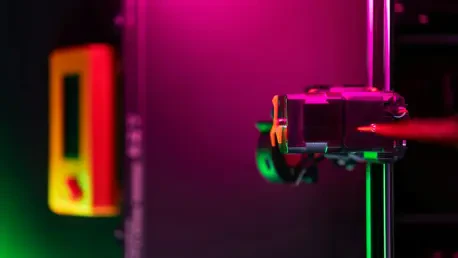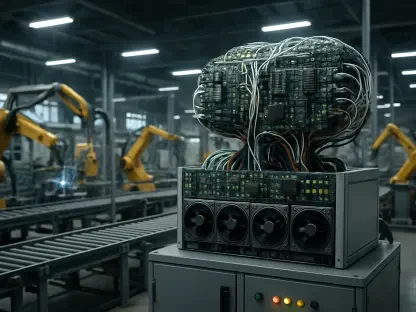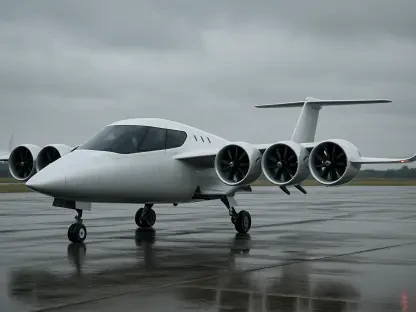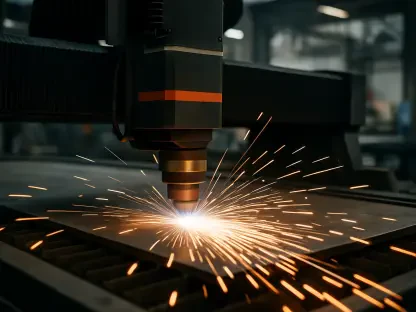In a world where industrial innovation is reshaping the very fabric of manufacturing, Automation Taipei, held from August 20 to 23 at the Nangang Exhibition Center, emerged as a pivotal stage for groundbreaking advancements. Delta, a global leader in automation and industrial solutions, captivated attendees with an impressive showcase under the theme “AI-Enabled Smart Manufacturing.” Their booth at Hall 1, 4F, stand No. M606, transformed into a hub of cutting-edge technologies, offering a glimpse into how industries such as electronics, automotive, logistics, and semiconductors are being redefined. This event was more than a display of gadgets; it was a bold statement on tackling real-world production challenges through seamless integration of artificial intelligence, intuitive systems, and data-driven workflows. Delta’s solutions promise to elevate efficiency and revolutionize human-robot collaboration, setting a new benchmark for modern manufacturing environments.
Cutting-Edge Technologies on Display
AI-Powered Robotics
Delta’s Collaborative Robots, often referred to as Cobots, marked their Asia debut with a striking demonstration of artificial intelligence capabilities through an innovative AI Cognitive Module. These robots are engineered to respond to voice commands and adjust paths in real time, ensuring both precision and safety in dynamic settings. With payload capacities ranging from 6 to 30 kg, coupled with IP66 protection and Reflex Safety technology, they are built to handle demanding tasks across sectors like automotive assembly and logistics. This adaptability positions them as indispensable partners on factory floors where flexibility is paramount. The integration with NVIDIA Omniverse further enhances their development by enabling high-fidelity simulations, significantly cutting down deployment time and costs for manufacturers looking to stay ahead of the curve.
Beyond the impressive hardware, the focus on human-robot collaboration stood out as a defining feature of Delta’s robotics showcase. These Cobots are not merely tools but facilitators of safer and more intuitive workplaces, reducing the risk of accidents through real-time environmental awareness. Their ability to adapt to sudden changes ensures uninterrupted workflows, a critical need in high-stakes industries. Additionally, the seamless connection with simulation platforms allows engineers to test and refine operations virtually before implementation, minimizing errors in live settings. This technology signals a shift toward smarter, more responsive systems that prioritize both productivity and worker well-being, redefining expectations for industrial automation.
Digital Twin Innovations
The Cyber-Physical Integration Demo Line presented by Delta offered a compelling look at how digital twin technology is transforming production processes. By leveraging tools like the Virtual Machine Development Platform (DIATwin) and NVIDIA’s Isaac Sim, this system enables manufacturers to simulate and validate machine recipes virtually before physical deployment. Internal estimates suggest this approach reduces prototyping costs and physical tuning downtime by approximately 20%, a significant saving for global operations. Such innovation bridges the gap between conceptual design and real-world application, allowing for faster cross-regional production line setups and smoother introductions of new products in competitive markets.
Equally noteworthy is how this technology addresses the challenges of scalability and precision in manufacturing. The Demo Line integrates production line management systems to provide a cohesive platform where virtual simulations directly inform physical outcomes, minimizing discrepancies. This capability proves invaluable for industries requiring rapid adaptation to market demands, as it slashes the time traditionally spent on trial-and-error adjustments. Furthermore, the data gathered from these simulations offers actionable insights, empowering decision-makers to optimize workflows before resources are committed. Delta’s emphasis on cyber-physical integration highlights a forward-thinking strategy to enhance operational efficiency across diverse industrial landscapes.
Industry-Specific Solutions
Electronics Assembly Breakthroughs
In the realm of electronics manufacturing, Delta showcased a sophisticated approach to distributed production with centralized control, utilizing smart equipment and digital platforms for maximum efficiency. The Demo Line featured tools like the D30 Inserter and Reconfigurable Transformer Machine (RTM) for precision tasks such as glue dispensing, while Cobots autonomously recognized incoming materials and executed pre-validated processing paths. The Line Manager system played a crucial role by synchronizing data between IT and operational technology systems, enabling rapid line changeovers and real-time updates to machine recipes. This level of integration ensures that production remains agile, meeting the fast-paced demands of the electronics sector with ease.
Another critical aspect of this showcase was the emphasis on data-driven decision-making to maintain a competitive edge. By providing mobile app access to key metrics like throughput rates and root cause analysis, Delta’s solutions empower managers to monitor and adjust operations on the fly. This real-time visibility into production processes helps identify bottlenecks before they escalate, ensuring consistent output quality. The seamless flow of information between systems also supports predictive maintenance, reducing unexpected downtimes that can disrupt supply chains. Such advancements illustrate how Delta is paving the way for smarter, more responsive electronics assembly lines that can adapt to evolving industry needs without sacrificing precision or speed.
Logistics and Warehousing Advances
Delta’s commitment to revolutionizing logistics and warehousing was evident through tailored solutions designed to enhance automation and sustainability. The Smart Machine Connectivity Solution, powered by the Advanced IIoT Controller AX-5 and HMI DOP-300, facilitates seamless data exchange and real-time monitoring via mobile devices. Meanwhile, the AI-powered Enterprise WLAN Solution optimizes wireless connectivity for automated guided vehicles (AGVs), ensuring smooth operations in busy warehouse environments. These tools collectively address the growing need for efficient data handling and connectivity, critical components in modern logistics where delays can have cascading effects on supply chains.
Complementing these connectivity innovations were Delta’s e-vehicle charging solutions, which underscored a focus on sustainable industrial operations. The MOOVbase Modular Charging System, capable of delivering up to 30 kW, and the MOOVair Wireless Charging Systems, ranging from 1 to 30 kW, provide fast, contactless charging for industrial vehicles like AGVs, forklifts, and pallet trucks. This technology not only reduces operational downtime but also aligns with global efforts to minimize energy waste in logistics. By integrating such forward-thinking solutions, Delta demonstrates a holistic approach to addressing both efficiency and environmental considerations, setting a new standard for automation in warehousing that balances productivity with long-term sustainability goals.
Thought Leadership and Trends
Educational Outreach
Delta’s presence at Automation Taipei extended beyond technology displays to include impactful educational initiatives that fostered industry collaboration. A series of seminars focused on digitizing production and operation management, offering practical insights into blending global trends with local adaptation. A standout session, conducted in partnership with NVIDIA experts, delved into the transformative potential of digital twins in manufacturing, leveraging tools like NVIDIA Isaac Sim and PhysX. These discussions provided attendees with a deeper understanding of how simulation technologies can enhance operational efficiency, equipping them with strategies to implement similar advancements in their own facilities.
The value of these educational efforts lies in their ability to bridge knowledge gaps and inspire innovation across sectors. By facilitating dialogue between industry leaders and technology experts, Delta created a platform for sharing best practices and exploring future possibilities in smart manufacturing. The emphasis on real-world applications during these sessions ensured that theoretical concepts were grounded in practical outcomes, making the content accessible to a wide range of professionals. This commitment to knowledge-sharing positions Delta as a thought leader, driving the conversation around digital transformation while empowering others to adopt cutting-edge solutions tailored to their unique challenges.
Broader Industry Shifts
Delta’s showcase reflected significant trends shaping the industrial sector, particularly the rapid integration of artificial intelligence into manufacturing processes. The functionality of adaptive systems like Cobots highlights a growing reliance on AI to improve human-robot collaboration, ensuring safer and more efficient workplaces. Additionally, the push for data synchronization between IT and operational technology systems underscores the importance of real-time insights for agile decision-making. This trend is especially critical in industries like electronics assembly, where rapid line changeovers are essential to maintaining competitiveness in fast-moving markets.
Another key shift evident in Delta’s presentation is the increasing adoption of digital twins to streamline production cycles. By reducing the time and cost associated with design-to-tuning phases, this technology addresses long-standing challenges in scaling operations globally. Furthermore, the focus on sustainable solutions, such as wireless charging for e-vehicles in logistics, aligns with broader efforts to enhance energy efficiency across industrial operations. These developments collectively signal a transformative era in manufacturing, where connectivity, adaptability, and sustainability converge to redefine how industries operate, with Delta at the forefront of this evolution.









